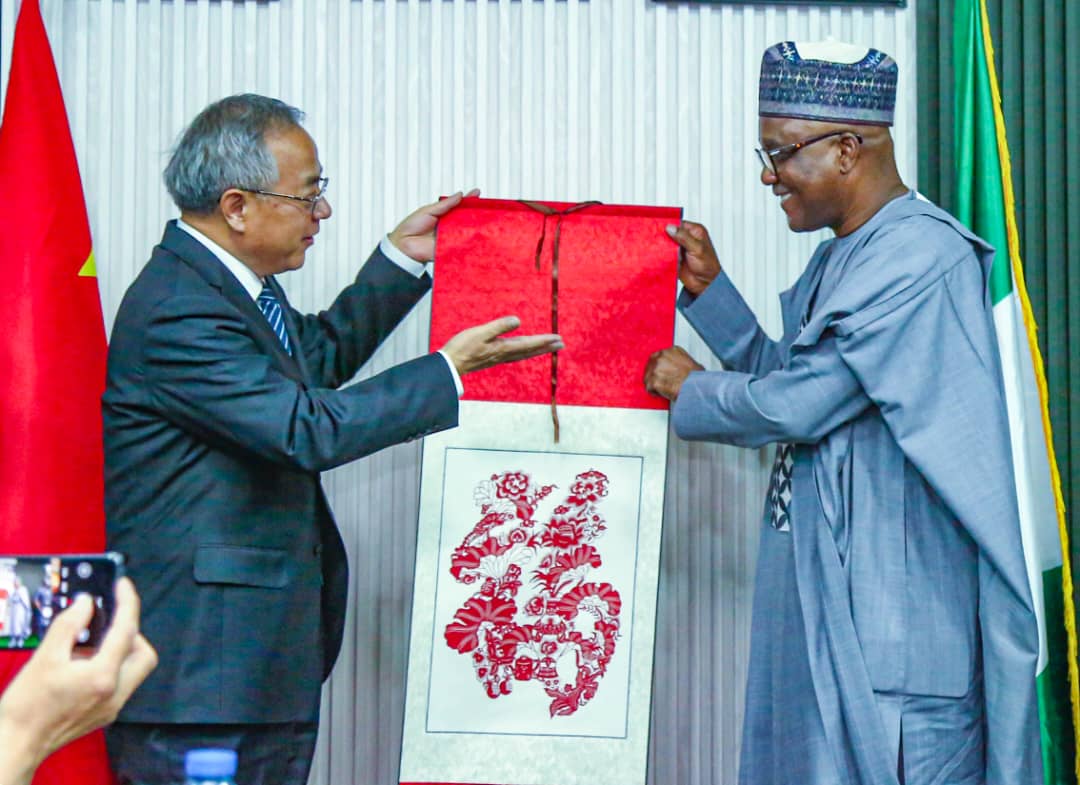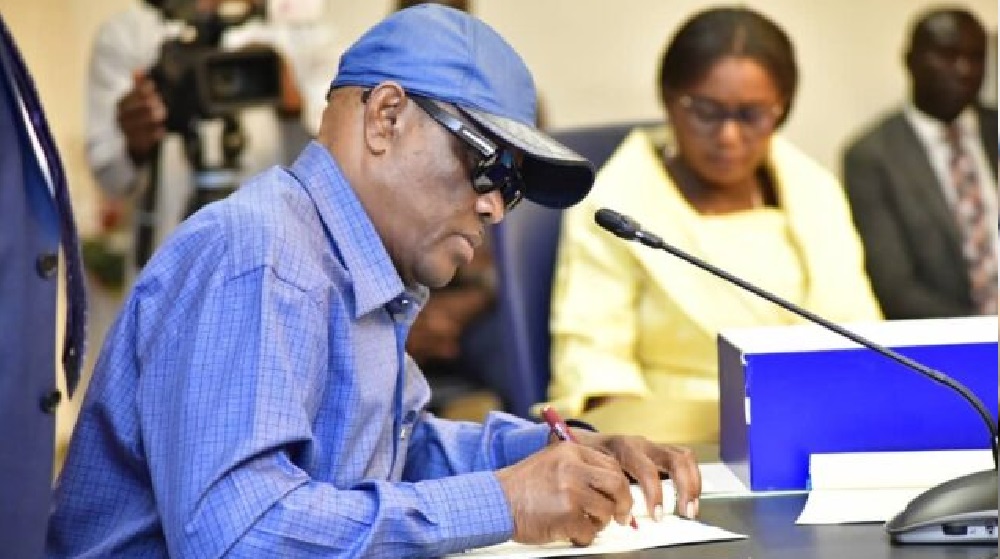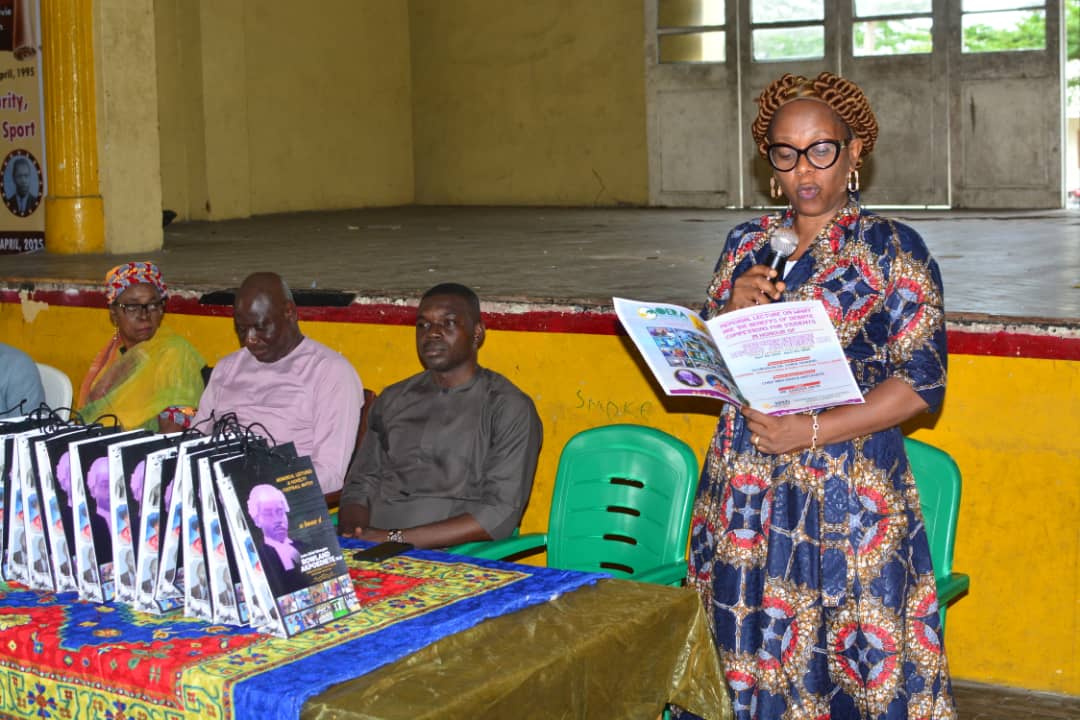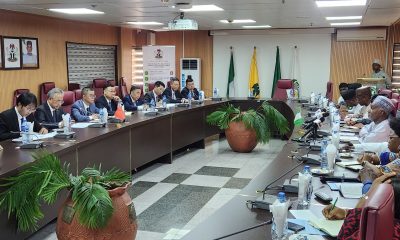News
Fuel price may crash to N500 per litre-Marketers

Strong indications emerged at the weekend that prices of Premium Motor Spirit (PMS), popularly called petrol, may crash further in 2025.
Industry experts, who spoke to Saturday Sun, noted that petrol, which currently sells for between N900 and N950 in many fuel stations, may have its price further crashing to as low as N500 a litre in the course of the year.
According to oil stakeholders, the likely drop in prices of petrol in 2025 is premised on a strong downstream sector propelled by the deregulation policy of the federal government.
According to industry players, other reasons for the price drop include stable foreign exchange policy, price competition, Naira-for-crude policy and the coming on stream of the Port Harcourt, Warri, and Dangote refineries. They also affirmed that for the refineries to sell their products in the domestic market and accept payment in naira will contribute to price fall.
The Federal Executive Council (FEC) had last July approved the sale of crude to local refineries for payment in naira.
In addition to this is the rebound of activities by modular refineries, which are now upbeat about the downstream sector and have concluded plans to add petrol refining to their stable of products in addition to diesel which hitherto was their sole product line.
This comes as Nigeria’s current daily petrol consumption has hit approximately 40 million litres with local production. According to truck out data from the Nigerian Midstream and Downstream Regulatory Authority (NMDPRA), Dangote Refinery contributes an average of seven million litres while NNPCL controls 1.2 million litres, bringing the total to 8.2 million litres.
Modular refineries are out of the picture as they only produce diesel for now. The country currently has about 25 licensed modular refineries but only five are in operation.
This means that only 20.5 per cent of the country’s petrol need is met through local refining, while the remaining 79.5 per cent or 31.8 million litres are imported.
At the moment, the Dangote Refinery is producing about 30 million litres of petrol but only injects about seven million litres into the domestic market, a figure which increased by five million litres in October, up from its initial 25 million litres.
On the contrary, the 125,000 barrels per day Warri Refining and Petrochemical Company (WRPC), which commenced operations a few days ago, is operating at 60 per cent capacity with the production of Kerosene, Diesel and Naphtha.
Prior to the commencement of operations of Warri refinery, the 60,000 barrels per day old Port Harcourt Refinery, which commenced operations over a month ago, is injecting about 1.4 million litres of petrol via blending with straight-run gasoline, 1.5 million litres of diesel and 2.1 million litres of LPFO.
According to the Group Chief Executive Officer (GCEO), NNPC Ltd, Mr Mele Kyari, the 150,000 Port Harcourt Refinery 2 is currently undergoing rehabilitation and is at 90 per cent completion stage, ditto for the Kaduna Refinery which is also undergoing rehabilitation. But a presidency source told Saturday Sun that the Kaduna Refinery may not come on stream anytime soon due to the huge cost implication and other technical reasons.
Though Kyari had recently said NNPC was no longer importing petrol, major marketers and some private depot owners were still importing about 30 million litres daily to bridge supply shortfall.
But the National Publicity Secretary of the Independent Petroleum Marketers Association of Nigeria (IPMAN), Mr. Ukadike Chinedu, in a telephone interview with Saturday Sun, said the coming on stream of Port Harcourt and Warri refineries is a game changer for the downstream sector as it will promote a healthy price competition as already being witnessed.
He said both the Nigerian National Petroleum Company Ltd and Dangote have reduced prices in the last three weeks, a signal to the gains of multiple sources of production.
Besides, he said the coming on stream of the NNPC Ltd refineries in addition to Dangote’s gives petroleum marketers and consumers the option of multiple sources of products as against a monopoly market.
Ukadike was upbeat that this development will see prices of petrol drop further below N500 per litre in 2025 as more players add capacity to refining petroleum products.
Again, he said the foreign exchange policy of the Federal Government is already yielding some positive results with a dollar exchanging for less than N1,800, adding that if this trend is sustained, petroleum prices would crash further because more foreign exchange would be conserved when products are no longer imported.
He further disclosed that more modular refineries are now beginning to take steps to add petrol refining to their line of product because they are now certain of the market through improved product demand.
According to him, all these improvements being witnessed in the sector is as a result of the deregulation of the downstream sector, which promotes efficiency, healthy rivalry and price competition among players to the benefit of the consumers.
The IPMAN Publicity Secretary further pointed out that the naira-for crude policy of the Federal Government is a major factor that will shape petrol prices in 2025 as it would tame inflation and reduce foreign exchange pressure
Also speaking, the President of the Petroleum Products Retail Owners Association of Nigeria (PETROAN), Mr Billy Harry, aligned with Ukadike.
Harry assured that the coming on stream of the Port Harcourt and Warri refineries would lead to cheaper fuel options for Nigerians.
The PETROAN President maintained that the possibility of affordable petrol for Nigerians is very feasible in 2025.
‘’As you can see, NNPC has reduced its ex- depot price from N1, 045 per litre to N899 per litre for marketers, translating to N925 per litre at the pumps for the end users. This, I must say, is very commendable. These are not small drops, but massive drops from N1, 045 to N899 ex- depot is a lot of drop.”
On the other hand, he said the Dangote refinery equally implemented a similar ex- depot price slash from N970 to N899.50 per litre. He pointed out that with the consistent availability of petroleum products, competition will set in and prices of petroleum products will drop further in the New Year.
In his submission, the Publicity Secretary of Crude Oil Refiners Association of Nigeria (CORAN), Mr Iche Idoko, said Nigerians would gradually begin to witness the gains, which is typical of a deregulated market.
“Price drop is one of the characteristics of deregulation we had highlighted. As the industry settles in to the regime of full deregulation, we are bound to see competitions amongst players, which ultimately will benefit the consumers.”
According to him, these competitions will be around prices, product quality, and credit lines available to bulk buyers.
This, he said, are the advantages that local refining brings. As more local refineries come on stream in the coming months, the industry shall see these positive trends of refiners and suppliers wooing consumers with price reduction and all manner of incentives.
News
US Tariffs: Speaker Abbas Looks to China, Calls for Closer Ties

News
FCT minister, Wike gives land allotees 21 days to pay or lose offer

The Federal Capital Territory Administration (FCTA) has given land allottees 21 days to pay all statutory Right of Occupancy (R of O) bills and charges or lose the offer.
Mr Lere Olayinka, Senior Special Assistant on Public Communications and Social Media to the FCT Minister, disclosed this at a news conference in Abuja on Friday.
Olayinka explained that the measure was part of the broad and comprehensive reforms on land administration in the FCT, approved by the FCT Minister, Mr Nyesom Wike.
He said that the reforms, which would become operational from April 21, covers specific areas like conditions of grant of statutory R of O, and contents of the statutory R of O bill.
Others, he said, would include contents of Letter of Acceptance/Refusal of offer of grant of R o O, titling of mass housing and sectional interests, as well as regularisation of area council land documents.
He explained that the crux of the sweeping reforms in the FCT land administration would ensure the regularisation of land allocations in area councils and title of mass housing properties in favour of buyers.
He added that the land allottees were also expected to develop allocated lands within two years.
Olayinka noted that before now, deadline for payment of bills, rents, fees and charges were not specified in the statutory R of O bill, with no penalty for failure to make payment promptly.
According to him, the non-collection of R of O and non-payment of bills has caused delay in revenue generation due to the FCTA.
“It has also caused slower pace of infrastructural development and promote sustained land speculation and racketeering.
“Also, huge expenses have been incurred by the FCT Administration through repeated advertisements and publications notifying the public on the need for collection of R of O and timely payment of bills and charges.
“Consequently, as against the unspecified period within which to collect the R of O and make full payment of the bills and charges, land allottees now have 21 days from the date of offer to make full payment of all bills, fees, rents and charges prescribed on offers, and submit a duly completed letter of acceptance alongside evidence of payments or lose the offer.”
The spokesman added that FCTA had equally given land allottees two years from the date of the commencement of the R of O to erect and complete development on any land granted in the FCT.
This, according to him, is against the lengthy or unspecified period within which to develop allocated lands.
“Therefore, any R of O bills and other payments made outside the stipulated 21 days shall be considered invalid while any land granted should be developed within two years,” he said.
Also, the Director of Land Administration, FCTA, Chijioke Nwankwoeze, said this was the first time the Administration had reviewed its land administration to improve efficiency.
Nwankwoeze said that with this development, allottees would no longer hold their R of O in their house and assumed they owned a land in FCT.
He said that beginning from April 21, any offer of R of O must be paid for within 21 days of offer to validate acceptance.
“So, acceptance of the offer of statutory R of O in the FCT is now tied to payments of the accompanied bills,” he said.
The director of land also said that for lands allocated in the area councils, the allottees would be expected to make all payments within 60 days.
News
OERAF Holds Memorial Lecture on the Benefits of Debate Competitions for Students in Ughelli


The Executive Director of Olotu and Ekuogbe Rowland Akpodiete Foundation (OERAF), Dr. Olotu Otemu Akpodiete, held a memorial lecture on the benefits of debate competitions for students in Ughelli, Ughelli North Local Government Area of Delta State.
The event took place, April 10, 2025, in honor of the remembrance of the passing of his grandfather, the late Chief Ekuogbe Rowland Akpodiete, Ph.D.
In his opening remarks, Dr. Olotu Akpodiete encouraged the students to take their academic activities very seriously, assuring them that his foundation would continue to provide support for quality education in Nigeria.
Olorogun Dr. Chris Oharisi, Chairman of the Board of Governing Council at Delta State College of Health Science and Technology, Ofuoma-Ughelli, who chaired the occasion, advised the students to be optimistic.
He emphasized the importance of debate to students, stressing that it helps them excel in public speaking.
On his part, Mr. Samson Obor, Principal of Government College Ughelli, thanked the organizers (OERAF) for their good work and encouraged the students to take their studies seriously.
He added that the importance of debate can never be overemphasized.
Presenting the lecture, Olorogun (Mrs.) Grace Akpodiete highlighted several benefits of debate for students.
She mentioned four major benefits: academic benefits, personal benefits, career benefits, and life skills benefits.
She concluded that by participating in debate competitions, students can develop a wide range of skills that benefit them academically, personally, and professionally.
During her speech about the life of the late Chief Ekuogbe Rowland Akpodiete, Barrister (Mrs.) Agboka Akpodiete-Omale highlighted his integrity and commitment to philanthropy.
She praised him as a great disciplinarian, dedicated community leader, lawyer, and known for his generosity.
Chief Dr. Linda Ikpuri, in her closing remarks, expressed satisfaction with the great job that Olotu and Ekuogbe Rowland Akpodiete Foundation is doing, assuring that she would collaborate with OERAF to build a better society.
Other highlights of the event included the presentation of cash prizes to various schools in attendance.
The schools included Lulu Schools, Government College Ughelli, Otovwodo Grammar School, Oharisi Secondary School, Transcorp Secondary School, Ekakpamre, Girls Model Secondary School, Evwreni, Divine Fire School, and Ekiugbo Grammar School.
-

 News20 hours ago
News20 hours agoSecurity operatives halt attempt to break into VP Shettima’s residence, nab suspect
-

 News20 hours ago
News20 hours agoSuit Seeking To Sack Ibas As Administrator Suffers Heavy Setback
-

 News12 hours ago
News12 hours agoConstituents Drag Akpabio, Senate to Court Over Suspension of Natasha
-

 News17 hours ago
News17 hours agoIbas pouring petrol on fire in Rivers, Briggs laments
-

 News19 hours ago
News19 hours agoPAINFUL! Six Persons Perish In Helicopter Crash
-

 News13 hours ago
News13 hours agoNigeria-China Reaffirms Commitment To Strategic Partnership
-

 Economy20 hours ago
Economy20 hours agoCHECK Exchange Rate As Naira Weakens More In Parallel Market
-

 News11 hours ago
News11 hours agoFCT minister, Wike gives land allotees 21 days to pay or lose offer















